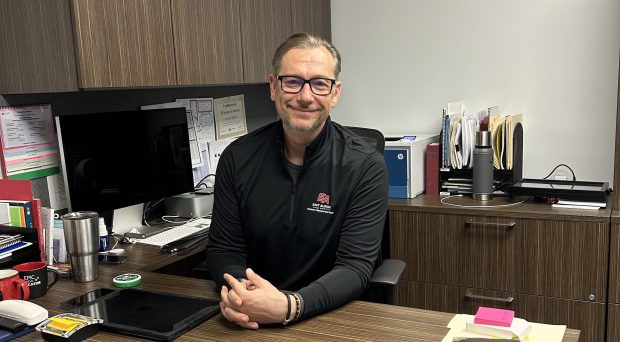The obituary of Sister Rose Marie Lorentzen was as humble as the woman herself, who died Dec. 20 in Dubuque, Iowa, at the age of 89.
Not to take away from her other calls to service as a member of the Sisters of Charity of the Blessed Virgin Mary (BVM), which is headquartered there, but the obit only briefly mentioned her role as “founder and executive director of a homeless shelter in Aurora.”
That shelter is, of course, Hesed House, which opened in 1981 and not only became the largest such facility in the state outside the city of Chicago but an undisputed national model for ending homelessness.
More than 7,500 volunteers representing over 90 area churches, businesses and service organizations serve more than 1,000 men, women and children in desperate need at Hesed House. Most recently, the shelter nearly doubled its capacity with the November opening of the new expansion facility across from the original building at 659 S. River St.
Although she was never able to tour this beautifully renovated building, no doubt that project’s completion made the Hesed House founder both proud and grateful in her final days here on Earth.
Sister Rose Marie was, in her long career with the BVM congregation, a parish minister, bilingual community college instructor and tutor; an elementary teacher in Chicago; a secondary teacher in Milwaukee and Memphis, Tennessee; and a religious education instructor in Chicago and Franklin Park.
But she was also a tireless advocate for social justice, and her gift for teaching instilled that passion in so many she met, including here in Aurora, where she saw a need to provide shelter for the homeless and “went toe to toe” with officials to make it happen, said former Hesed House Executive Director Ryan Dowd.
She did it all at a time when the Aurora community was not always supportive.
“No way in hell could I have opened Hesed House,” admitted Dowd, who led the organization from 2004 until 2020 and still serves on its leadership team. “It took someone willing to fight the systems and power brokers to make it happen.”
Longtime Aurora Ald. Mike Saville clearly recalls those early days, when he and Mayor David Pierce were among a handful of supporters from City Hall who met with Sister Rose Marie in the old municipal incinerator building on South River Street.
“While we saw nothing but blackened walls” and smelled the “lingering odor of burned trash,” Saville remembered, Sister Rose Marie “saw a vision of what it could be,” a shelter for the homeless who, until that point, were being served piecemeal through a half-dozen local churches.
“She had to be tough in the ways of the world,” noted Saville. “But she had a lovely heart and a mind that was constantly working for the betterment of others.”
And she made sure her vision for this shelter would be part of its structure long after she retired in 2004, say those who followed closely in her footsteps.
Dowd insists he could tell the difference between Hesed House and other shelters, even as a 13-year-old volunteer. That’s because the Aurora facility “was built around a higher calling that went even beyond the services it provided as a shelter and resource center,” he insisted.
“From day one Sister Rose Marie built a community where you viewed humanity in a very specific way … it very much felt like you were coming home,” he said.
Later, after joining the staff at age 21, Dowd said getting to know Sister Rose Marie personally “felt like Luke Skywalker discovering Yoda” as she was able to integrate “the Hesed ethos into even ordinary conversation.”
It was a “learning philosophy of how to be kind in an oftentimes unkind world,” he added. “Anyone can do the structure, the fundraising. But it is the way she taught the Hesed ethos that made the shelter into what it is today. She brought a deeper understanding that, for me, was absolutely essential.”
Current Hesed House Executive Director Joe Jackson agrees, recalling that first meeting with the long-retired nun when he was about to take the reins from Dowd in November of 2020.
Jackson fondly describes that three-and-a-half-hour dinner as a “crash course in what is Hesed,” also noting it was Sister’s heart for the most vulnerable, along with her “complete and total lack of judgement of those she served,” that made her so remarkable.
Those who worked closely with the nun described her as a woman of contrasts, who could be serious, intense, efficient and plenty tough when needed. But she also thought nothing of dressing up like a Raggedy Ann doll for Halloween or spending joyous moments watching the little children in the shelter at play.
Certainly she could also be described as a trailblazer, beyond even Hesed House and the Fox Valley.
Not only are other shelters patterned after the Aurora organization’s comprehensive approach to homelessness, Dowd now runs a company that trains groups and businesses, including major corporations like McDonald’s, on how to compassionately treat the homeless.
Sister Rose Marie is also credited with the foundation of Joseph Corporation in 1990, a nonprofit to help people secure affordable housing.
“She was not only a principled and virtuous woman of faith but also a woman of action,” said Rick Guzman, who was a major player in that organization, which merged under the Neighbor Project he launched in 2018.
The Hesed House founder, he noted, will also be remembered through a new 20-unit affordable housing project in the works via a partnership with Hesed House, Neighbor Project and Association for Individual Development. .
Jackson recalls that when he told Sister the complex will be named “Las Rosas” in her honor, he was not in the least surprised when she reacted with a quick thank-you but then wanted more information about the residents of Hesed House.
No doubt she was honored, he told me. But with Rose Marie, ego would always take a back seat to the mission.
All of which might explain her simple obituary.
Sister Rose Marie, noted Guzman, would likely have been uncomfortable receiving so much attention, and would want the focus to be directed toward her congregation, and other nuns also in the trenches, including the late Sister Mary Catherine Daly and Sister Peg Barrett.
Jackson recalls recently looking into a storage area for some old records, and coming across a box filled with dozens of awards Sister Rose Marie had received, including a plaque honoring her work from the United Nations.
“Most people would have that hanging on a wall,” he said, “rather than gathering dust in the corner of a storage room.”
For Sister Rose Marie Lorentzen, it really was all about the people in need.
Which is why “there was something beautiful and fitting” about the timeline of her death that occurred on the same day Hesed House was holding its “Longest Night Ceremony” honoring all residents and former residents who died in 2024, noted Jackson.
“The day she left us,” he said, “made all the sense in the world.”
dcrosby@tribpub.com
Editor’s Note: Funeral services will be held for Sister Rose Marie Lorentzen at 9 a.m. Friday, Jan. 10, at the Mary Frances Clarke Chapel at Mount Carmel Bluffs in Dubuque, Iowa, followed immediately by a Mass of Christian Burial in the Mount Carmel Cemetery in Dubuque.




